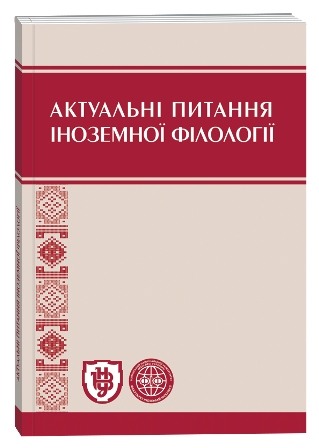WAYS OF FORMATION OF NEOLOGISMS AND THEIR FUNCTIONS IN THE ENGLISH LANGUAGE
DOI:
https://doi.org/10.32782/2410-0927-2021-15-12Keywords:
euphemism, formation of euphemisms, linguistics, functions, featuresAbstract
The article is devoted to the investigation of euphemisms functioning in the English language. The scientific investigations of the past and present presented by Ukrainian as well as foreign researches have been thoroughly analyzed concerning the main approaches to the definition of the notion euphemism. Many approaches as to the classification of euphemisms have been singled out while conducting the scientific research. The aim of the article is to define the main word building and functional peculiarities of euphemisms. The following methods have been used while conducting the research: the method of logical analysis of the scientific research, the descriptive method, the method of definition and content analysis. The scientific novelty has been proved by presenting the determination of the speech means that serve to create euphemisms. The area of neologism functioning is vast. They are widely used by the youth and adults alike (there is even gender distinction that requires further investigation as the problem has not been revealed properly), by ordinary people and politicians alike, by the media and clergy people and others. There is still no clear definition of the notion euphemism accepted worldwide by the scientists. Due to the thorough analysis of the scientific resources the following conclusion has been made: euphemisms are classified according to 1) the level of their usage in the language system; 2) the area of their usage; 3) time usage. The classification of euphemisms is based upon the principals such as: functional-pragmatical, distributive and lexical-semantic. The main functions of euphemisms are as follows: hiding, cooperative, preventive, rhetorical, elevating, conspiracy and distortive. The basic ways of the formation of neologisms have been singled out and they take place on different language levels: lexical, semantic, phonetic, word-building and stylistic. The cognitive processes and interconnectional relations are the key elements of the formation of neologisms; with the help of the latter ones the understanding of euphemism is possible in the modern English language. Still, euphemisms as means of tolerant and mild expression of speech should be investigated in a proper way.
References
Великорода В. Б. Семантичні та функціонально-прагматичні характеристики евфемізмів в англійській мові : дис. … канд. філол. наук: 10.02.04. Львів, 2007. 268 с.
Кантур К. О. Аналіз механізмів антропосемічної евфемізації // Вісник Житомирського державного університету імені Івана Франка. Житомир, 2012. Вип. 66. С. 210–214.
Мілєва І. В. Евфемізація і дисфемізація у фразеотворенні говірок сходу України : дис. ... канд. філол. наук: 10.02.01. Луганськ, 2005. 235 с.
Постатнік М. М. Евфемізми, причини їх виникнення, особливості вживання та перекладу (на матеріалі німецької мови) // Матеріали науково-теоретичної конференції викладачів, аспірантів, співробітників та студентів гуманітарного факультету. Суми, 2015. Ч. 2. С. 14−15.
Словник української мови: в 11 томах. Том 2, 1971. Академічний тлумачний словник (1970−1980). [Електронний ресурс]. URL: http://sum.in.ua/s/ (дата звернення: 2.02.2022).
Ткачівська М. Р. Евфемізм або мовна дипломатія (на прикладі української мов). Прикарпатський вісник НТШ. 2016. № 2 (34). С. 102–111.
Українська мова : енциклопедія / ред. рада: В. М. Русанівський, О. О. Тараненко, М. П. Зяблюк та ін., 2-ге вид., Київ, 2004. 824 с.
Burridge K. Political Correctness: Euphemism with Atittude // English Today. 1996. Vol. 12. N 3. P. 42−49.
Partridge A. Usage and Abusage. N. Y., 1964. 379 p.
Rada Roberta. Tabus und Euphemismen in der deutschen Gegenwartssprache: mit besonderer Berücksichtigung der Eigenschaften von Euphemismen. Budapest, 2001. 212 s.
Rowson H. A. Dictionary of Euphemisms and Other Doubletalk. New York, 2002. 324 р.







